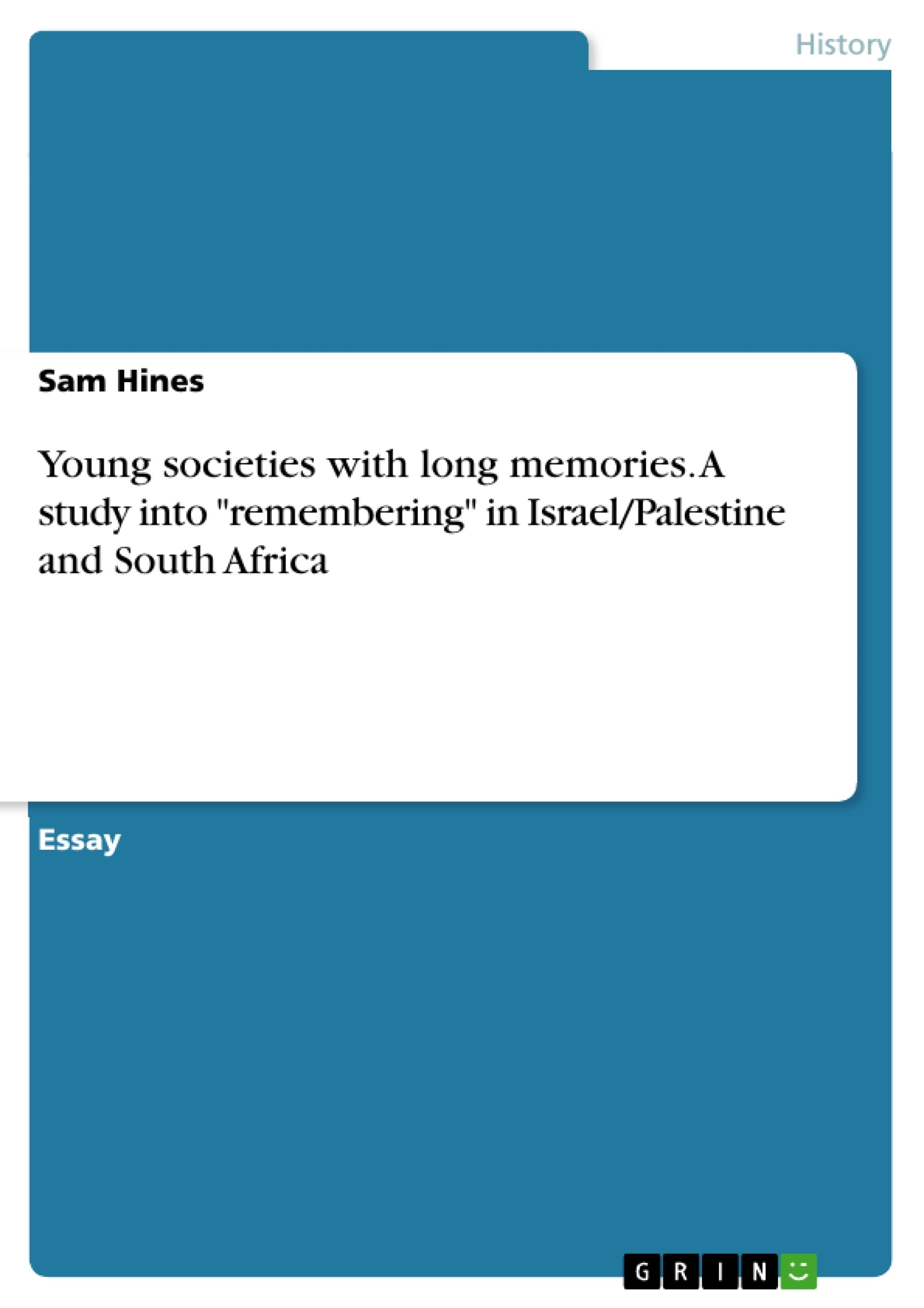This essay will investigate whether a memory can predate a nation’s formation and whether they can, in fact, be ‘long’ by conducting a study from two angles - the first exploring persisting memories from before 1948 and the second examining the memories of that year and beyond. By focusing mainly on Israeli and Palestinian society but also touching on South African, it will conclude that young societies can have long memories: these communities all drew upon their past experiences (or what they believed to be their past experiences), whether they be during times of colonial occupation or other traumatic events across the globe, to create a prosthetic, collective memory to augment a quasi-ubiquitous nationalistic sentiment and enhance zealous beliefs. Ultimately, as Megill notes, in moments of crisis, people often hark back to the past with greater intensity, valorising memory and weaving embellished narratives into the political and cultural discourse.
Societies are trapped in their own past, characterised by their collective ideologies, understanding and memories. Although a society may be ‘young’ in terms of its conception date, citizens inherit pre-state narratives that heavily influence and shape contemporary actions and ideas. These ‘long’ memories tend to be ‘collective’, a narrative in which individual memories agglomerate in an intersubjective process, being exchanged, appropriated and forgotten. During this process, the frontiers between what one has actually ‘experienced’ and what one believes they have experienced - through hearing or reading for example - often become blurred, leading to the creation of a prosthetic memory.
Inhaltsverzeichnis (Table of Contents)
- Young societies with long memories.
- The Zionist movement
- Colonialism and Anti-Semitism
- 1948 and the Palestinians
- The memory of Colonialism in Palestine
Zielsetzung und Themenschwerpunkte (Objectives and Key Themes)
This essay aims to investigate whether a society's memory can predate its formation and if such memories can be considered 'long'. It accomplishes this by studying two case studies: Israel/Palestine and South Africa, focusing on the role of memory in shaping national identity and political actions.
- The role of collective memory in shaping national identity
- The influence of pre-state narratives on contemporary actions and ideas
- The concept of prosthetic memory and its impact on societal narratives
- The relationship between memory, colonialism, and apartheid
- The impact of traumatic events on national identity and memory
Zusammenfassung der Kapitel (Chapter Summaries)
- The essay begins by defining the concept of 'long memories' in young societies, arguing that pre-state narratives play a significant role in shaping present-day actions and beliefs.
- The author then examines the role of memory in the Zionist movement, highlighting how historical narratives were used to justify the creation of Israel and bolster nationalistic sentiment.
- The essay explores the relationship between colonialism, anti-Semitism, and the formation of an apartheid regime in Israel, arguing that the memory of these historical experiences shaped the state's political and social structures.
- The author analyzes the Palestinian perspective of 1948, emphasizing the traumatic impact of the Nakba and the enduring influence of colonialism on Palestinian identity.
- The essay concludes by examining the role of memory in Palestine, highlighting how the Palestinian society, despite its lack of official statehood, utilized memories of colonialism to maintain its national identity and claim to the land.
Schlüsselwörter (Keywords)
The key themes of the essay include collective memory, prosthetic memory, national identity, colonialism, anti-Semitism, apartheid, the Nakba, and the Israel/Palestine conflict.
Frequently Asked Questions
Can a society's memory be older than the nation itself?
Yes, the essay argues that young societies often inherit pre-state narratives that heavily influence their contemporary national identity and political actions.
What is "prosthetic memory"?
It refers to memories of events that an individual did not personally experience but has adopted through cultural narratives, books, or media, making them part of their own identity.
How does memory shape the Israel/Palestine conflict?
Both societies draw on traumatic pasts—such as the Holocaust for Zionism and the Nakba for Palestinians—to justify their claims to the land and strengthen nationalistic sentiment.
What is the connection between memory and colonialism in South Africa?
The memory of colonial occupation and the apartheid regime continues to shape the social and political structures of the modern South African state.
Why do people hark back to the past during crises?
In moments of crisis, societies often valorize memory to create embellished narratives that provide a sense of continuity and collective purpose.
- Quote paper
- Sam Hines (Author), 2019, Young societies with long memories. A study into "remembering" in Israel/Palestine and South Africa, Munich, GRIN Verlag, https://www.hausarbeiten.de/document/980114


